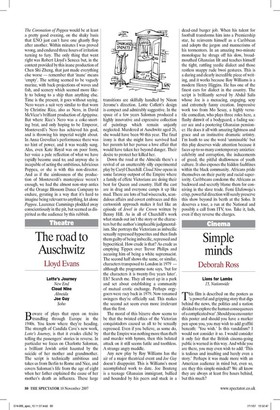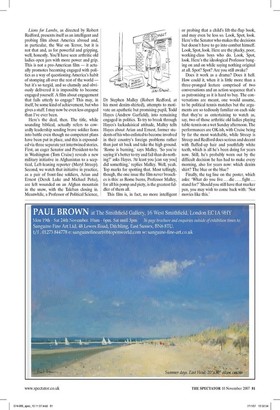Simple minds
Deborah Ross Lions for Lambs 15, Nationwide rr his film is described on the posters as 'a powerful and gripping story that digs behind the news, the politics and a nation divided to explore the human consequences of a complicated war'. Shouldyou encounter this poster and should you have a marker pen upon you, you may wish to add graffiti beneath: 'You wish.' Is this vandalism? I would not consider it so. I would consider it only fair that the British cinema-going public is warned in this way. And while you are there, you may even wish to add: 'This is tedious and insulting and barely even a story.' Perhaps it was made more with an American audience in mind but, even so, are they this simple-minded? We all know they are always at least five hours behind, but this much?
Lions for Lambs, as directed by Robert Redford, presents itself as an intelligent and probing film about America abroad and, in particular, the War on Terror, but it is not that and, as for powerful and gripping, well, honestly. You'll have seen arthritic old ladies open jars with more power and grip. This is not a pro-American film — it actually promotes becoming engaged with politics as a way of questioning America's habit of stomping all over the rest of the world — but it's so turgid, and so clumsily and obviously delivered it is impossible to become engaged yourself. A film about engagement that fails utterly to engage? This may, in itself, be some kind of achievement, but who gives a stuff. I may now be even less engaged than I've ever been.
Here's the deal, then. The title, while sounding biblical, actually refers to cowardly leadership sending brave soldier lions into battle even though no competent plans have been put in place, and this is expounded via three separate yet intertwined stories. First, an eager Senator and President-to-be in Washington (Tom Cruise) reveals a new military initiative in Afghanistan to a sceptical, Left-leaning reporter (Meryl Streep). Second, we watch that initiative in practice, as a pair of front-line soldiers, Arian and Ernest (Derek Luke and Michael Peria), are left wounded on an Afghan mountain in the snow, with the Taleban closing in. Meanwhile, a Professor of Political Science, Dr Stephen Malley (Robert Redford, at his most denim-shirted), attempts to motivate an apathetic but promising pupil, Todd Hayes (Andrew Garfield), into remaining engaged in politics. To try to break through Hayes's lackadaisical attitude, Malley tells Hayes about Arian and Ernest, former students of his who enlisted to become involved in their country's foreign problems rather than just sit back and take the high ground. 'Rome is burning,' says Malley. 'So you're saying it's better to try and fail than do nothing?' asks Hayes. 'At least you [can say you did something,' replies Malley. Well, yeah. Top marks for spotting that. Most tellingly, though, the one issue the film never broaches is this: as Rome burns, Professor Malley, for all his pomp and piety, is the greatest fiddler of them all.
This film is, in fact, no more intelligent or probing that a child's lift-the-flap book, and may even be less so. Look, Spot, look. Here's the Senator who makes the decisions but doesn't have to go into combat himself. Look, Spot, look. Here are the plucky, poor, working-class boys who do. Look, Spot, look. Here's the ideological Professor banging on and on while saying nothing original at all. Spot? Spot? Are you still awake?
Does it work as a drama? Does it hell. How could it, when it is little more than a three-pronged lecture comprised of two conversations and an action sequence that's as patronising as it is hard to buy. The conversations are meant, one would assume, to be political tennis matches but the arguments are so tediously familiar on each side that they're as entertaining to watch as, say, two of those arthritic old ladies playing table-tennis on a wet Sunday afternoon. The performances are OK-ish, with Cruise being by far the most watchable, while Streep is Streep and Redford does serious and decent with fluffed-up hair and youthfully white teeth, which is all he's been doing for years now. Still, he's probably worn out by the difficult decision he has had to make every morning, also for years now: which denim shirt? The blue or the blue?
Finally, the tag line on the poster, which asks: 'What do you live ... die .... fight ... stand for?' Should you still have that marker pen, you may wish to come back with: 'Not movies like this.'






































































 Previous page
Previous page